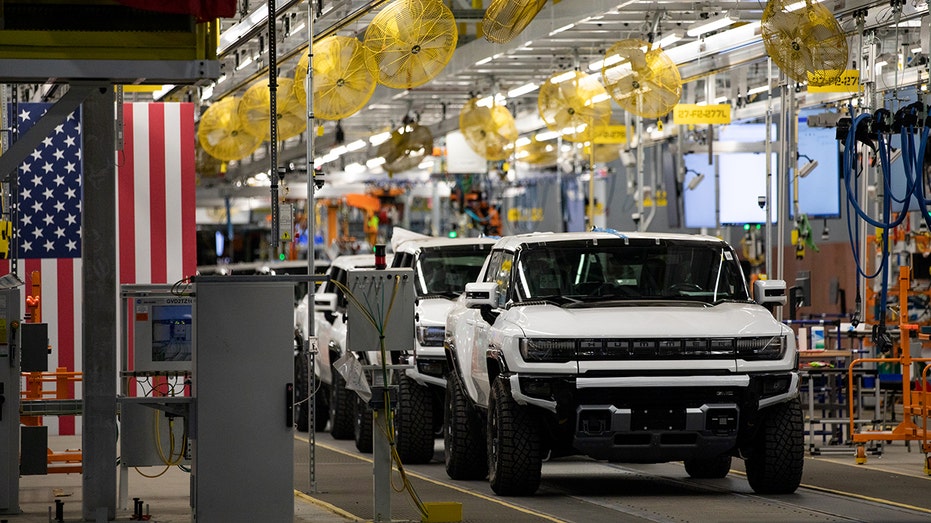Experts slam Pete Buttigieg's comments on EVs: 'A con job'
"Americans have been given a false impression about EVs," researcher Patrick Anderson tells FOX Business
Transportation Secretary Pete Buttigieg's recent comments that electric vehicles (EVs) are cheaper than traditional alternatives were misleading, experts told FOX Business.
Buttigieg suggested EVs can be cheaper than comparable cars with internal combustion engines and more cost-effective to fill up, in response to a question from Rep. Scott Perry, R-Pa., during a House hearing Wednesday. During his questioning, Perry noted the high average cost of EVs and asked what the Biden administration's plans were to lower such costs for American consumers.
"I knew this might come up, so I pulled a few of the latest prices," Buttigieg told Perry. "A Chevy Bolt, an American-made 2022 EV is $26,595. If you want a pickup truck, like a Chevy Silverado EV or Ford F150 Lightning, the starting prices of those are $39,900 and $39,974, respectively."
BUTTIGIEG ANNOUNCES NEW INVESTIGATIONS OF AIRLINES AMID RISING PASSENGER DISSATISFACTION
"But what we're seeing in terms of the dynamics now is we're close to the point, and may actually be there on certain models and under certain circumstances, where the extent to which your car payment would go up, is actually already outweighed by the extent to which your gas bill would go down, even factoring in the cost of electricity," he continued.
However, experts highlighted that cheaper EVs are still more expensive than comparable traditional cars and must be charged more often due to their relatively low range. For example, the 2022 Chevy Bolt referenced by Buttigieg costs $26,595 and has a range of 259 miles while the traditional engine 2022 Chevy Spark costs $14,595 and has a range of 297 miles, according to company data.
"Customers are clever enough to figure this out despite the snow job from the electric vehicle promoters and people like Secretary Buttigieg," Myron Ebell, the director of the Competitive Enterprise Institute's Center for Energy and Environment, told FOX Business in an interview.
"It's really kind of a con job," Ebell said. "It may be a good deal for some people in some places under some circumstances. But by-and-large right now, it's not a good deal."
ELECTRIC CAR REVOLUTION: YOU BOUGHT ONE, BUT CAN YOU GET IT SERVICED?
Overall, the average cost of an EV was $64,338 while the average cost of a compact car was $26,101 as of May, according to Kelley Blue Book. Factoring in government incentives, the average cost of EVs are likely closer to $60,000.
In addition, the Department of Energy reported in January that the average range of model year 2021 gasoline vehicles was 403 miles compared to the median 234-mile range of model year 2021 EVs. That means EV owners must pay to charge their vehicle more frequently than owners of traditional cars.
ZIGGY: The EV charging robot that rolls to you
EV Safe Charger founder and CEO Caradoc Ehrenhalt introduces the robotics firm's mobile solution to 'charge anxiety' on 'The Claman Countdown.'
"We systematically researched the entire industry — who buys cars, where they're built, how much they cost, what segments they're in and what consumers do with them," said Patrick Anderson, the founder of Michigan-based Anderson Economic Group (AEG). "Our research shows that a lot of Americans have been given a false impression about EVs."
In April, AEG released its annual report analyzing the real world costs of vehicle ownership, comparing EVs to gasoline-powered cars. The report concluded that traditional mid-priced 2021 cars have a cost advantage over mid-priced EVs after factoring in electricity costs, charging equipment costs, road taxes and "deadhead miles," the distance consumers need to travel to remote charging stations.
BUTTIGIEG SLAMS GOP AS ‘GOING TO WAR WITH MICKEY MOUSE’ WHILE DEMS ‘FIND SOLUTIONS’ TO INFLATION
EVs charged using residential and normal commercial charging methods cost about $0.50 more per 100 miles than comparable traditional vehicles, according to the report. EVs charged using more expensive commercial charging stations cost about $4 more per 100 miles.
"The first thing that a lot of potential electric vehicle owners need to be aware of is that they're probably going to be paying both their home utility bills and the cost of charging at commercial chargers," Anderson told FOX Business. "Failing to understand that a large number of miles that the typical American travels are away from home and require using a fueling station that's not in their garage, would be a very costly mistake for a potential EV driver."

GMC Hummer electric vehicles are pictured on the production line at General Motors' Factory ZERO assembly plant in Detroit, Michigan on Nov. 17, 2021. Emily Elconin/Bloomberg via Getty Images (Fox News)
Anderson added that AEG's research showed 78% of electric vehicles are luxury vehicles and most EV purchasers also own traditional vehicles.
"A very large share of the electrical vehicles themselves are owned by affluent people and, often, wealthy people," he said, arguing government subsidies for EVs mainly benefit the upper class.
Ebell echoed Anderson and said EV owners are "free-loading" off Americans who own gasoline-powered cars since the federal gas tax funds roads and infrastructure. EV owners aren't required to pay an equivalent tax for infrastructure funding.
CLICK HERE TO GET THE FOX BUSINESS APP
Meanwhile, President Biden has aggressively pushed for an expansion of EV ownership in the U.S. as part of his effort to combat climate change. Biden has pledged to ensure 50% of new car purchases are electric by the end of the decade and every addition to the government fleet is electric by 2035.
In 2021, EVs accounted for 4.6% of new car sales in the U.S., according to a May report from the International Energy Agency.






















